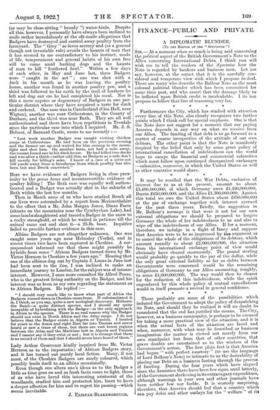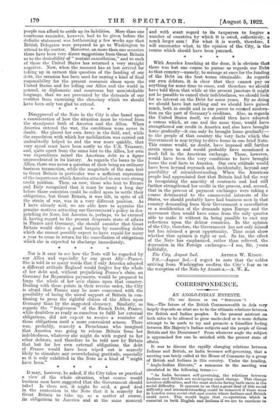F 1 NANCE—PUBLIC AND PRIVATE,
A DIPLOMATIC BLUNDER.
[To THE EDITOR or THE " SPECTATOR."J SIR,- At a moment when so much is being said concerning the political aspect of the British Government's Note to the Allies concerning International Debts, I think you will wish me to tell the readers of the Spectator how the Note is regarded by bankers and business men. Let me say, however, at the outset that it is the carefully con- sidered and temperate view with which I propose to deal. There are many who describe the Balfour Note as the most colossal political blunder which has been committed for some time past, and who assert that the damage likely to be inflicted upon British credit is incalculable. I do hot propose to follow that line of reasoning very far.
Furthermore the City, which has studied with attention every line of this Note, also clearly recognizes two further points which I think call for special emphasis. One is that the Note does not suggest for a moment that our paying America depends in any way on what we receive from our Allies. The funding of that debt is to go forward as a matter of course irrespective of the attitude of our own debtors. The other point is that the Note is manifestly inspired by the belief that only by some great policy of international cancellation of indebtedness can the world hope to escape the financial and commercial calamities which must follow upon continued disorganized exchanges —calamities, moreover, in which the United States as well as other countries would share.
It may be recalled that the War Debts, exclusive of interest due to us at the present, amount to about £3,400,000,000, of which Germany owes £1,450,000,000, Russia 050,000,000, and the Allies £1,300,000,000. Against this total we owe the United States about £850,000,000 at the par of exchange together with interest accrued for the past three years. Briefly, the suggestion in Mr. Balfour's message is that were it not for our own external obligations we should be prepared to forgive Germany the whole of her indebtedness to us and also to wipe off the indebtedness of our Allies. If for a moment, therefore, we indulge in a flight of fancy and suppose that America were to be so impressed by the argument as to cancel the whole of the obligations of its debtors, which amount roundly to about £2,000,000,000, the situation from the international exchange point of view would obviously have cleared enormously. The pound sterling would probably go quickly to the par of the dollar, while the only great external liability so far as debts between Governments were concerned would be the remaining obligations of Germany to our Allies amounting, roughly, to some £4,000,000,000. The way would then be clearer for the reduction of this indebtedness, while the spirit engendered by this whole policy of mutual cancellations would in itself promote a revival in general confidence.
Those probably are some of the possibilities which induced the Government to adopt the policy of despatching its Note, and should they be realized it will no doubt be considered that the end has justified the means. The City, however, as a business community, is perhaps to be excused for taking a more practical view of the situation, and it is when the actual facts of the situation are faced and when, moreover, with what may be described as business imagination the matter is viewed not merely from our own standpoint but from that of other countries, that grave doubts are entertained as to the wisdom of the Government's action. The first plain fact is that America had begun "with perfect courtesy" (to use the language of Lord Balfour's Note) to intimate to us the desirability of placing our Debt on a business footing through the process of funding. During the four years which have elapsed since the Armistice there have been few signs, until latterly, of the Government slackening in its extravagant expenditure, although warnings in your own and other journals have been neither few nor feeble. It is scarcely surprising, therefore, that America should feel that a country which can pay doles and other outlays for the " welfare " of its people can afford to settle up its liabilities. More than one courteous reminder, however, had to be given before the definite statement was forthcoming a. few weeks ago that British Delegates were prepared to go to Washington to attend to the matter. Moreover, on more than one occasion there have been very direct suggestions from Great Britain as to the desirability of "mutual cancellation," and to each of these the United States has returned a very straight negative. Now, when the moment has at last arrived for taking up in earnest this question of the funding of our debt, the occasion has been used for casting a kind of final responsibility for the present economic chaos upon the United States and for telling our Allies and the world in general, in diplomatic and courteous but unmistakable language, that we are prevented by the demands of our creditor from exercising the clemency which we should have been only too glad to extend.
Disapproval of the Note in the City is also based upon a consideration of how the situation must be viewed from the standpoint both of America and the Allies. When America entered the war, the conditions were never in doubt. She placed her own Army in the field, and, while the expedition with which her mobilization was carried out undoubtedly helped to end the war more quickly, that very speed must have been costly to the U.S. Treasury, and, quite apart from the sums lent to the Allies, her own war expenditure raised the American debt to a figure unprecedented in its history. As regards the loans to the Allies, there was never a question of their being an ordinary business transaction, while the magnitude of the sum lent to Great Britain in particular was a sufficient expression of the importance which America attached to our own strong credit position. Then, as now, those who lent to France and Italy recognized that it must be many a long day before those countries could be called upon to settle their obligations, but Great Britain, it was felt, in spite of all the strain of war, was in a very different position. As I have already said, we are able here to appraise the genuine motives actuating our Government's policy in des- patching its Note, but America is, perhaps, to be excused if, having regard to the present desperate state of affairs in France and Germany, she should consider that Great Britain would drive a good bargain by cancelling debts which she cannot possibly expect to have repaid for many a year to come in return for the cancellation of obligations which she is expected to discharge immediately.
Nor is it easy to see how the Note will be regarded by our Allies and especially by our great Ally—France. She is told in so many words that if only America adopted a different attitude England would forgive her the whole of her debt and, without prejudicing France's claim on Germany for Reparation payments, would be prepared to forgo the whole of her own claims upon that country. Dealing with these points in their reverse order, the City is afraid that France may be more concerned with the possibility of losing the moral support of Britain in con- tinuing to press the rightful claims of the Allies upon Germany than by the suggested clemency. Similarly, as regards the " forgiveness " of the French Debt, France, while doubtless as ready as ourselves to fulfil her external obligations, did not expect to receive a reminder of those obligations until a more convenient season. There was, probably, scarcely a Frenchman who imagined that America was going to release Britain from her indebtedness, whatever she might do with regard to her other debtors, and therefore to be told now by Britain that but for her own external obligations the debt of France would have been wiped out is scarcely likely to stimulate any overwhelming gratitude, especially as it is only exhibited in the Note as a kind of might have been.'
It may, however, be asked, if the City takes so practical a view of the whole situation, what course would business men have suggested that the Government should take? Is there not, it might be said, a good deal in the contention in the Note that it is scarcely for Great Britain to take up, as a matter of course, its obligations to America and at the same moment and with scant regard to its taxpayers to forgive a number of countries by which it is owed, collectively, a much larger sum ? For what it is worth, therefore, will summarize what, in the opinion of the City, is the. course which should have been pursued.
With America knocking at the door, it ia obvious that there was but one course to pursue as regards our Debt to that country—namely, to arrange at once for the funding of the Debt on the best terms obtainable. As regards our own debtors, it is clear that they cannot pay uri anything for some time to come, and therefore we should have told them that while at the present juncture it might not be possible to cancel their indebtedness, we should look for no interest on the Debt for some years. By so doing we should have lost nothing and we should have gained much, both in credit and in our power to counsel modera- tion on the part of Germany's creditors. Also, as regards the United States itself, we should then have adopted a course which, at one and the same time, would have strengthened our credit in America and also have brought home gradually—it can only be brought home gradually— to the people of that country the very facts which the Government is now trying to drive home in one brief Note. This course would, no doubt, have imposed still further strain upon us and would probably have occasioned a fresh fall in the American exchange. Those, however, would have been the very conditions to have brought home the real facts to America. Our own attitude would have been beyond reproach and, incidentally, beyond any possibility of misunderstanding. When the American people had appreciated first that Britain had led the way in recognizing the sanctity of contracts and had still further strengthened her credit in the process, and, second, that in the process of payment exchanges were taking a course detrimental to the commercial interests of the States, we should probably have had business men in that country demanding from their Government a cancellation or a modification of the demands upon Europe and the movement then would have come from the only quarter able to make it without its being possible to cast any reflections upon the debtor countries. In the opinion of the City, therefore, the Government has not only missed but has misused a great opportunity. Time must show whether that opinion is right or not. So far, the effect of the Note has emphasized, rather than relieved, the depression in the Foreign exchanges.—I am, Sir, yours faithfully, P.5.—August 3rd.—I regret to note that the cables arriving from Washington confirm the City's fear as to the reception of the Note by America.—A. W. IL



































 Previous page
Previous page